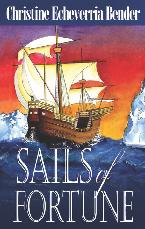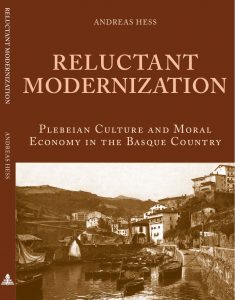As you probably have noticed by now, some of my pages aren’t quite working right, with PHP pages asking if you want to download them. That is because of a change in server configuration I wasn’t aware of and now my files aren’t parsed quite right. I’m working on getting that fixed and hope to do so as soon as possible.
Whiskey Daredevils, Berri Txarrak and Bilbao

Woodworth: More Basque Violence
Paddy Woodworth, who has written two books on the Basque Country — Dirty War, Clean Hands and The Basque Country: A Cultural History — has written an op-ed piece in the NY Times about the recent bombings by ETA in Spain.
Being Basque
Last month, my family and I were up in Idaho to visit grandparents. While visiting amuma and aitxitxa (now affectionately known as “txitxi”), a couple of dad’s buddies got together at the Txoko Ona, their Basque center in Homedale, to eat and play cards. They’d planned it a bit, but it wasn’t an overly involved production, just 4 or 5 guys, one making lamb stew and bbq’ing lamb ribs, another making bread, getting together and living life just like they might have in the old country. They let me tag along, and while they were playing Mus, chatting away in Euskara, I couldn’t help thinking to myself that this is what being Basque really is about. These guys don’t have to do anything to show their Basqueness, they just are Basque.
Don’t get me wrong, I enjoy the big events, especially the ones that pull people from all over as I then get a chance to see old acquaintances and the like, people I wouldn’t get to see otherwise. And it’s great to see the dancing, the sports, and the rest as such a profound expression of culture. Later that month Homedale had it’s own Basque picnic, which drew in a respectable crowd, and I got to have my chorizo and kalimotxo, and see some old friends.
But, there is also something very special just seeing these guys do their thing. Not trying to be Basque, but just being Basque by being themselves. As the sheepherder generations leave us, we will be missing something crucial in the fabric of the Basque community. One can only hope that the outward expressions of Basque culture that the collective “we” work so hard in keeping alive can draw new blood from the Basque Country to keep the foundation solid.
Calling all Ocamicas…
 Miguel Ocamica, the son of Ramon, a good friend of my dad’s who was one of the chorizo crew I posted about a while back, is trying to gather the Ocamicas of the world together. The goal is to establish a family tree of some sort between all the Ocamicas of the world. To facilitate this, they have created a group on Facebook, Apellido Ocamica. If you are a Ocamica or know of one, please pass on this news so that the history of the Ocamica family name can be known.
Miguel Ocamica, the son of Ramon, a good friend of my dad’s who was one of the chorizo crew I posted about a while back, is trying to gather the Ocamicas of the world together. The goal is to establish a family tree of some sort between all the Ocamicas of the world. To facilitate this, they have created a group on Facebook, Apellido Ocamica. If you are a Ocamica or know of one, please pass on this news so that the history of the Ocamica family name can be known.
Euskal Kazeta — Basque News
 To Basques in the US, Nancy Zubiri is well known. Author of A Travel Guide to Basque America, there is probably no one who knows better both the current landscape of Basque America or how that landscape came to be. Thus, it is very fitting that Nancy has just launched a new project, an online news magazine of all things Basque, Euskal Kazeta. Featuring articles and stories about the Basques in the Caribbean, pilotaris in Bakersfield, and Aita Tillous, Euskal Kazeta exploits Nancy’s knowledge and network to bring fascinating stories, both past and present, from all corners of the Basque experience. The site is well designed and allows visitors to leave their thoughts on what they read. Euskal Kazeta is a great addition to cyberEuskadi, the Basque presence on the web.
To Basques in the US, Nancy Zubiri is well known. Author of A Travel Guide to Basque America, there is probably no one who knows better both the current landscape of Basque America or how that landscape came to be. Thus, it is very fitting that Nancy has just launched a new project, an online news magazine of all things Basque, Euskal Kazeta. Featuring articles and stories about the Basques in the Caribbean, pilotaris in Bakersfield, and Aita Tillous, Euskal Kazeta exploits Nancy’s knowledge and network to bring fascinating stories, both past and present, from all corners of the Basque experience. The site is well designed and allows visitors to leave their thoughts on what they read. Euskal Kazeta is a great addition to cyberEuskadi, the Basque presence on the web.
Dietary customs of Boise’s Basques
 You can tell the story of who people are by what they eat — stated Colleen Asumendi Fillmore, PhD, RD, LD
You can tell the story of who people are by what they eat — stated Colleen Asumendi Fillmore, PhD, RD, LD
All who know the Basques know that food is an immensely important aspect of their culture. Colleen Asumendi Fillmore knows this better than most, having studied the dietary culture of the Basques of Boise. Her work has culminated in a book, Basques of Boise: Adult Dietary Culture and Tradition, and a website, nutribasque.
From the website:
This website explores the nutrient standards and dietary culture of the Boise Basque. Who are the Boise Basque? Ninety percent or more of the Boise Basque community is from the Basque province of Bizkaia. The majority comes from a 20-mile stretch of coastline between Bermeo and Ondarroa in the northern part of Spain. This area encompasses the fishing village of Lekeitio, a Basque metropolis of Bilbao, and the historic Basque capital of Gernika, all in Bizkaia (Zubiri, 1998).
The United States is a country with a myriad of diverse ethnic groups with many adaptations in food habits, thus constantly changing our health and wellness. Most RDs (registered dietitian) agree that food habits relating to tradition, customs, behavior, culture and environment must continue to be studied to achieve advances in public health.
Reluctant Modernization by Andreas Hess
I just got this notice of a new book on Basque culture and was asked to spread the word.
Reluctant Modernization: Plebeian Culture and Moral Economy in the Basque Country
by Andreas Hess
Publisher: Peter Lang, Oxford
ISBN number: 978-3-03911-908-0
Three institutions that are of particular importance to Basque history and culture form the main subject of this book: the baserria (the Basque farmstead), the cofradia (the fraternity of fishermen) and the txoko (gastronomic society). In this study the three institutions are seen as windows; once we look through these windows, we get an opportunity to see the larger picture – namely the structural components of a rich plebeian culture and moral economy. While the investigation of baserri culture provides insights into Basque rural life and the radical changes that occurred with industrialization, the cofradia allows the reader to see the connection that the Basque Country has with the sea. The third institution, the txoko or sociedad gastronomica, represents a more recent and urban phenomenon and reflects an effort to come to terms with urbanization and the anonymous forms of modern life. The book closes with some reflections on cultures that have been somewhat reluctant to modernize.
Andreas Hess examines the ritualized contexts in which a culture shapes people’s basic definitions of lifestyle, identity and social allegiance. What sets apart this work is the combination of an almost ethnographic description of the Basque cultural institutions … and the proposal for a paradigm change in the study of current Basque issues by grounding the analysis squarely on political economy. The results go well beyond the Basque case. — Professor Joseba Zulaika, Center for Basque Studies, University of Nevada
The Author: Andreas Hess teaches sociology at University College Dublin. His main publications include the authored books American Social and Political Thought: A Concise Introduction (2000) and Concepts of Social Stratification: European and American Models (2001); and the edited books American Social and Political Thought: A Reader (2003) and (with Christian Fleck and E. Stina Lyon) Intellectuals and their Publics: Perspectives from the Social Sciences (2009).
Sails of Fortune by Christine Echeverria Bender
 Having read Laurence Bergreen’s description of Magellan’s circumnavigation of the globe, Over the Edge of the World (see this post), I was very interested in Christine Echeverria Bender’s take of the same voyage, Sails of Fortune, partially because I found Bergreen’s account so fascinating, but also because I knew Bender’s would cast a more favorable light on her central protagonist, the Basque mariner Juan Sebastian de Elcano.
Having read Laurence Bergreen’s description of Magellan’s circumnavigation of the globe, Over the Edge of the World (see this post), I was very interested in Christine Echeverria Bender’s take of the same voyage, Sails of Fortune, partially because I found Bergreen’s account so fascinating, but also because I knew Bender’s would cast a more favorable light on her central protagonist, the Basque mariner Juan Sebastian de Elcano.
When I first began Sails of Fortune, I was a bit apprehensive as I typically like my history with just the facts, as we know them, and not wrapped in fictional embellishments. Thus, I enjoyed Bergreen’s book as that was his approach, though he did let himself editorialize at times. And I was hesitant to begin Bender’s book, as she takes the opposite approach and couches the voyage from Elcano’s point of view, which requires liberties to be taken, especially as comes to motivation and impression of events.
Bender describes the voyage from the perspective of Elcano. Thus, some major events, such as the eventual death of Magellan, receive very little “screen” time as Elcano wasn’t present (he was on board his ship sick during the battle that lead to Magellan’s death). She does share her interpretation of Elcano’s reaction to the news and a brief retelling of the battle as one of those present reports the events to Elcano.
Despite my initial misgivings, I really enjoyed this novel and especially the telling of events from Elcano’s point of view. And I understand now why this approach, of trying to recreate the events from the perspective of one of the participants, is valuable, as having Elcano’s reaction to events described, even if to some degree they must have been fabricated, put those events in perspective and gave them more impact. I think I retained more about the facts of the voyage because of this than I did for Bergreen’s book (leading me to have to make some corrections when I posted my original thoughts here). Of course, this does lead me to wonder how much of Elcano’s thoughts Bender might have gleaned from his diary and how much is pure invention. Even so, even if the Elcano of Bender’s novel is not so similar to the real Elcano, he is definitely a character full of life and brings the voyage to life.
The facts of the voyage are consistent with Bergreen’s description. The main deviations occur in describing reactions to events. Bender makes Elcano out to be a very different character than Bergreen: Bender’s Elcano is a somewhat unwilling participant in the mutiny at San Julian while he is a central plotter in Bergreen’s book. Bergreen’s Elcano resents the status of men he considers his lessers, at least in terms of navigation experience, and he becomes bitter, while Bender’s Elcano is much more stoic and gracious and even turns down an offer to lead the expedition after Magellan is killed. Which is more accurate is hard to say, but both presumably draw on Elcano’s own diaries so it isn’t clear to me how much is each author’s interpretation of Elcano’s entries and how much is the result of their own biases.
One thing I found very interesting about Bender’s account is how personal the struggles and suffering of the men of the expidition became. Whether when in chains as a result of their failed mutiny (and the frustrations they had that led to that mutiny) or the true horror they must have faced when crossing the Pacific and falling to the ravages of scurvy, Bender gives us an inkling of how these men must have felt. From the beginning, we know that Elcano eventually returns to Spain, but by giving life to some of the other sailors serving with Elcano, by creating relationships between them and Elcano, the true suspense comes from who else will survive. After all, of the 237 men who left Spain, only about 30 returned.
Bender wastes no time on things that Elcano does not know. For example, Bergreen spends significant time on the desertion of the ship San Antonio and the capture of the ship Trinidad by the Portuguese. However, both of these events were things that were unknowable to Elcano, so we don’t really learn much about them. After he returns to Spain, Elcano learns that indeed the San Antonio had deserted the expedition, but little more is said.
Overall, once I got past my reluctance to begin this “historical fictional” novel, I was really sucked in and enjoyed it immensely. I now understand the value of these types of accounts of historical facts. I’m not sure I am ready to delve into many more of these, still preferring the more straight-forward factual accounts, but I’m definitely interested in reading Bender’s next book, The Whaler’s Forge.
Visit Christine Bender’s website for news on her upcoming book, The Whaler’s Forge.
For more information about Magellan and the voyage, see this Wikipedia article. This Wikipedia article focuses on Elcano.
Over the Edge of the World by Laurence Bergreen
I originally wrote these thoughts in August of 2005 and thought I’d posted them here, but just realized I hadn’t. In looking back, there are clearly some errors in what I wrote, which I’ve corrected.
 Over the Edge of the World, by Laurence Bergreen, tells the story of the first voyage around the world, the Magellan expedition. Drawn mostly from the accounts of the voyage chronicler, Pigafetta, as well as the pilot logs of other crew members, it tells how Ferdinand Magellan, a Portuguese, tried to get his king to fund a voyage to the Spice Islands by sailing west instead of east. After many refusals, Magellan finally decided to try a different avenue and approached the king of Spain, King Carlos, who agreed to fund the expedition. After assembling a crew and five ships, Magellan set sail from Sevilla to attempt the first circumnavigation of the globe.
Over the Edge of the World, by Laurence Bergreen, tells the story of the first voyage around the world, the Magellan expedition. Drawn mostly from the accounts of the voyage chronicler, Pigafetta, as well as the pilot logs of other crew members, it tells how Ferdinand Magellan, a Portuguese, tried to get his king to fund a voyage to the Spice Islands by sailing west instead of east. After many refusals, Magellan finally decided to try a different avenue and approached the king of Spain, King Carlos, who agreed to fund the expedition. After assembling a crew and five ships, Magellan set sail from Sevilla to attempt the first circumnavigation of the globe.
Bergreen does a wonderful job of describing all aspects of the voyage, from the politics behind Magellan’s attempts to find funding for the voyage to the voyage itself. He tells about the trials and tribulations that these men encountered, as well as the jubilation they felt for their accomplishments. At the time, scurvy was still a scourge for sailors and, while he doesn’t belabor the point, Bergreen shows us how the men suffered during the long months at sea, how their food supply became infected with maggots, how the men had to eat the food anyways. When the “action” is slow, when the men are at sea just struggling to survive, Bergreen describes the suffering but doesn’t linger. Thus, he avoids potentially slow aspects of the story, focusing instead on when events took place.
The first of these was in Brazil, where some of the men attempted to mutiny after many long months at sea with little more from Magellan than orders. The mutiny was thwarted and Magellan punished the mutineers severely, using tortures taken from the Inquisition. Some died as a result and some survived tortures so horrendous that it is simply amazing that they did. Shortly afterward, they encountered natives in Brazil and this was the first of many times in which the sailors enjoyed the company of the native women, with orgies taking place on these foreign beaches.
Bergreen describes how the crew pushed through the straights of Magellan, thinking that they would soon find the Spice Islands, not realizing how big the Pacific Ocean was. Eventually, they encountered islands near the Phillipines, where they made contact with the natives, generally peacefully. As the expedition went on, Magellan seems to have gained a larger and larger god complex. In these islands, he began converting the natives to Christianity and they were willing converts, at least superficially. At times, though, he threatened them with violence if they did not convert. Eventually, he decided to help one group against some enemies, trying to nearly single-handedly defeat the enemy. As he and his crew came ashore of the enemy island, they began burning buildings. At this, the natives attacked and eventually killed Magellan. Magellan never finished the voyage.
By this time, at least one ship had left the expedition, leaving during the passage of the Straight of Magellan and returning to Spain. Another had been lost searching for the Straight. At the time of Magellan’s death, three ships remained. Juan Sebastian de Elcano, a Basque mariner from Getaria, Gipuzkoa, took command of the expedition [correction: Elcano didn’t take command until the expedition split, with one ship continuing West and the other attempting to go East; he was never Captain-General of more than one ship]. It was decided that one ship would return east to America to try to find Spanish settlements there (this ship eventually was captured by the Portuguese). At some point, one was destroyed because it was in such bad condition. The last ship, full of spices, sailed west under Elcano’s command. After many more months, this ship finally returned to Spain. Of an original crew of 260 men, only about 20 or so returned [correction: in the end, it was about 30 men], led by Elcano.
While noting Magellan’s foibles and faults, Bergreen obviously feels he was a great man, and that it was only through his sheer determination and will that the expedition was successful. Bergreen is less than glowing when discussing Elcano, describing him as a glory hog who took all of the credit for Magellan’s deeds. It seems to me a little unfair, as Magellan nearly destroyed the expedition in his quest for glory in the Philippines. Elcano steered a single remaining ship around the horn of Africa and back to Spain, a not insignificant feat. I would say that Elcano deserves some of the glory he received, especially considering that in the English speaking world, Elcano is essentially an unknown figure.
So, Elcano becomes the first European to circumnavigate the globe. But was he the first person? One of Magellan’s servants understood the language of the Philippine islanders and was probably from that region, having gone to Europe via the Spice trade or via Arabs who had explored the region. However, Bergreen points out that his trip around the world was mostly accidental, not deliberate.
Once Magellan had been killed, the other crew forced this servant to stay on and translate for them. This led the servant to plot with the locals to betray the crew. They staged an elaborate dinner for much of the crew and then slew them on the beach.
Overall, this was an excellent book, describing in rich detail Magellan’s expedition. It describes the wonder that the men in Magellan’s crew experienced when encountering the glaciers of the Antarctic, the peoples they found in these exotic lands, and especially the sexual practices that the Europeans found so fascinating.
Recently, another book, “Sails of Fortune” by Christine Echeverria-Bender was published which deals with this exact same expedition. It will be interesting to compare the two recreations of this very important and interesting voyage.


